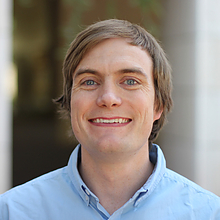 Christopher Metzler, an assistant professor of computer science with an appointment in the University of Maryland Institute for Advanced Computer Studies, is collaborating with researchers at Rice University on a new imaging system that can potentially “see through” objects and materials that reflect scattered light, thus obscuring other objects from view.
Christopher Metzler, an assistant professor of computer science with an appointment in the University of Maryland Institute for Advanced Computer Studies, is collaborating with researchers at Rice University on a new imaging system that can potentially “see through” objects and materials that reflect scattered light, thus obscuring other objects from view.
The multi-institutional team—funded by the Air Force Office of Scientific Research, the National Science Foundation and the National Institutes of Health—has developed a technology they call NeuWS, which is an acronym for “neural wavefront shaping,” the technology’s core technique.
The NeuWS technology could potentially be used to make cameras that can “see” through fog, smoke, driving rain, murky water, skin, bone and other media that currently reflect scattered light.
“Imaging through scattering media is the ‘holy grail problem’ in optical imaging at this point,” said Ashok Veeraraghavan, a professor of electrical and computer engineering at Rice and one of the lead investigators on the project.
The researchers recently published their work in Science Advances.
Conceptually, NeuWS is based on the principle that light waves are complex mathematical quantities with two key properties that can be computed for any given location. The first, magnitude, is the amount of energy the wave carries at the location, and the second is phase, which is the wave’s state of oscillation at the location.
Metzler and Veeraraghavan said measuring phase is critical for overcoming scattering, but it is impractical to measure directly because of the high frequency of optical light. They instead measure incoming light as “wavefronts”—single measurements that contain both phase and intensity information—and use backend processing to rapidly decipher phase information from several hundred wavefront measurements per second.
“The technical challenge is finding a way to rapidly measure phase information,” said Metzler, a Rice alum who earned his Ph.D., master’s and bachelor’s degrees in electrical and computer engineering from Rice.
Go here to read the full news article from Rice University.